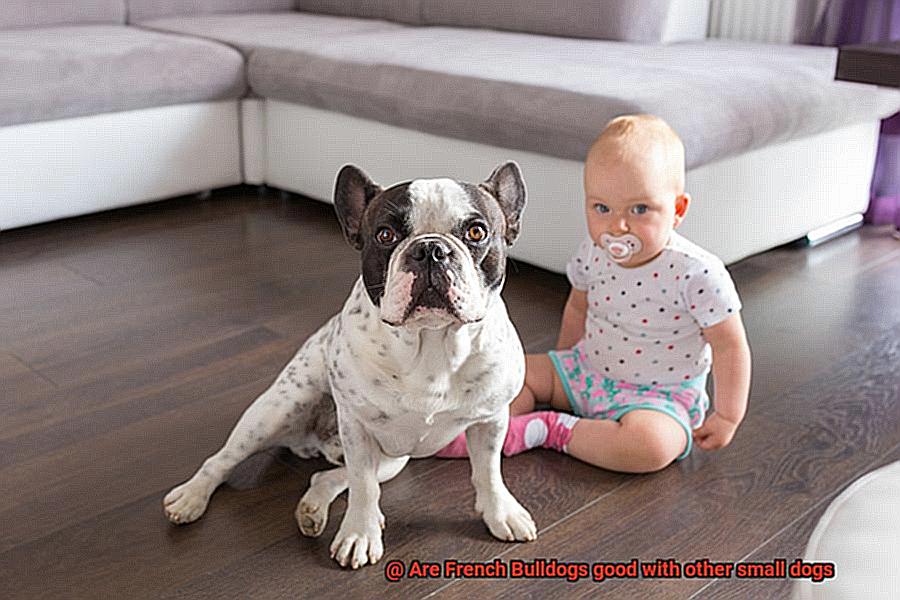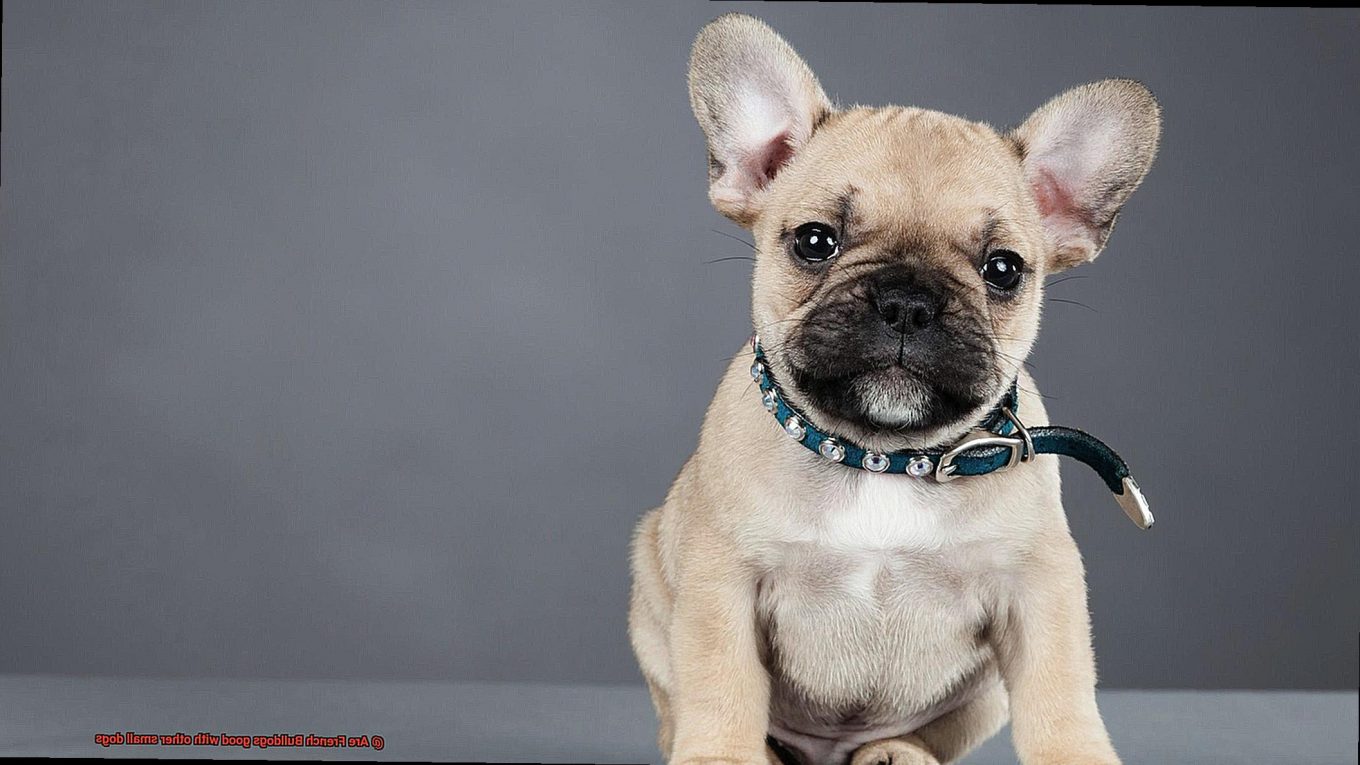Are French Bulldogs good with other small dogs?
Thinking about adding a French Bulldog to your furry family? One question you might be asking yourself is, “Do French Bulldogs get along with other small dogs?” It’s an important consideration when creating a harmonious pet dynamic in your home.
With their adorable bat-like ears and affectionate nature, French Bulldogs have stolen the hearts of dog lovers everywhere. But do these lovable companions feel the same way about their pint-sized counterparts?
In this blog post, we’ll explore the captivating world of French Bulldogs and their compatibility with other small dogs. We’ll uncover their natural tendencies, delve into factors that influence their behavior, and ultimately reveal whether Frenchies make excellent play buddies for other small dogs.
So grab your favorite drink, get cozy, and let’s dive into this fascinating topic to find out if French Bulldogs truly are the perfect playmates for other small dogs.
Understanding the Unique Personality of a French Bulldog
Contents
- 1 Understanding the Unique Personality of a French Bulldog
- 2 Socialization and Training for French Bulldogs
- 3 Introducing French Bulldogs to Other Small Dogs
- 4 Monitoring Interactions Between French Bulldogs and Other Dogs
- 5 Providing a Safe Environment for Interaction
- 6 Exercise and Mental Stimulation for French Bulldogs
- 7 Assessing Compatibility Between French Bulldogs and Other Small Dogs
- 8 When to Seek Professional Help for Aggressive Behavior
- 9 Conclusion
French Bulldogs are often described as friendly, sociable, and playful dogs. These unique personality traits play a significant role in how they interact with other small dogs. In this blog post, we will explore these traits in more detail and provide insights on how they affect their interactions with other dogs.
Friendly and Sociable Nature
One of the defining characteristics of French Bulldogs is their friendly and sociable nature. They are known to be excellent companions, getting along well with humans and animals alike. This friendly disposition often extends to other small dogs as well. French Bulldogs are generally not aggressive or confrontational, making them more likely to approach other dogs in a calm and amicable manner.
Playful and Energetic Disposition
French Bulldogs are also known for their playful and energetic disposition. They love engaging in activities and enjoy the company of other dogs that share their energy levels. If a French Bulldog is matched with a small dog that is also playful and energetic, they are likely to have a great time together. However, it is important to note that individual personalities can vary, and not all French Bulldogs may exhibit the same level of playfulness.
Stubbornness and Patience
French Bulldogs are notorious for their stubbornness. While this trait can make training challenging at times, it generally does not affect their ability to get along with other small dogs. In fact, some experts believe that French Bulldogs’ stubborn nature can make them more patient and tolerant towards other dogs’ behaviors. This patience can be especially beneficial when introducing them to new dogs or dealing with any potential conflicts that may arise during their interactions.
The Importance of Early Socialization
It is worth mentioning that early socialization plays a vital role in determining how well a French Bulldog will get along with other small dogs. Exposing them to various environments, people, and animals from a young age can help them develop positive associations and social skills. Proper socialization can also help prevent any potential aggression or fear-based behaviors towards other dogs.
Monitoring Interactions and Providing Training
While French Bulldogs generally have a friendly and sociable nature, it is important to remember that individual personalities can differ. Some French Bulldogs may not be as receptive to other small dogs, especially if they have not been properly socialized or have had negative experiences in the past. In such cases, it is essential to monitor their interactions and provide appropriate training and guidance to ensure a harmonious relationship with other dogs.
French Bulldogs are generally good with other small dogs due to their friendly and sociable nature. Their playful and energetic disposition makes them compatible with dogs that share similar energy levels. However, early socialization and individual personalities can also play a significant role in determining how well they get along with other dogs.
By understanding the unique personality traits of French Bulldogs and providing proper socialization, owners can foster positive relationships between their French Bulldogs and other small dogs.
Socialization and Training for French Bulldogs

Building positive relationships with other small dogs is essential for the social and emotional well-being of French Bulldogs. Socialization helps them develop confidence, learn appropriate behaviors, and establish lasting friendships. Here’s why socialization and training are crucial for French Bulldogs to have positive interactions with other small dogs.
- Confidence Boost: Socialization from an early age helps French Bulldogs gain confidence in various situations, including interactions with other dogs. By exposing them to different breeds and sizes of small dogs, you’re helping them become comfortable and confident around their canine pals.
- Learning Appropriate Behaviors: Through socialization, French Bulldogs learn how to interact politely with other dogs. They will discover appropriate play behaviors, such as chasing, wrestling, and gentle mouthing. It’s important to monitor these interactions and intervene if any signs of aggression or discomfort arise.
- Establishing Positive Relationships: Socialization allows French Bulldogs to establish positive relationships with other small dogs. These relationships can lead to lifelong friendships and companionship, providing them with the opportunity to engage in playdates and other enjoyable activities together.
Now that we understand the importance of socialization let’s discuss some practical tips for socializing French Bulldogs with other small dogs:
- Controlled Playdates: Arrange controlled playdates in a secure environment where the dogs can interact freely without any risk of harm. Monitor their behavior closely and intervene if necessary.
- Exposure to Different Breeds: Introduce your French Bulldog to a variety of breeds and sizes of small dogs to expose them to different personalities and temperaments. This diversity will help them become adaptable and accepting of different types of companions.
- Basic Obedience Training: Teach your French Bulldog basic obedience commands like “sit,” “stay,” and “come.” This will establish control over their behavior during social interactions and ensure they respond appropriately to commands.
- Leash Training: Proper leash training is crucial for controlling your French Bulldog’s behavior when encountering other small dogs during walks or outings. Teach them to walk calmly on a leash and respond to commands to prevent any potential conflicts or aggressive behaviors.
- Expose Them to Different Environments: Take your French Bulldog on outings to dog parks, pet-friendly cafes, or puppy classes. This exposure to different environments and situations will help them become more comfortable and confident in social settings.
Remember, positive reinforcement is key when training French Bulldogs. Rewarding them with treats, praise, and playtime for exhibiting good behavior will reinforce positive associations with other small dogs. Avoid punishment or harsh training methods as they can lead to fear and aggression.
Introducing French Bulldogs to Other Small Dogs
French Bulldogs are known for their playful and sociable nature, making them generally good with other small dogs. However, like humans, dogs have their own personalities and preferences. That’s why it’s important to introduce your French Bulldog to other small dogs in a controlled and supervised environment. Let’s dive into some tips and tricks for a successful introduction.
- Choose the Right Location: Start by selecting a neutral territory for the meeting, such as a park or a friend’s backyard. This way, neither dog feels territorial, and they can focus on getting to know each other.
- Keep Them Leashed: To have better control over the situation, keep both dogs on a leash during the initial introduction. This allows you to step in if needed and ensures their safety.
- Sniffing and Body Language: Allow the dogs to sniff each other from a distance while observing their body language. Look for signs of curiosity and interest, like wagging tails and relaxed postures. Beware of any signs of aggression or fear, such as stiff body language or growling.
- Gradual Interaction: If both dogs seem comfortable, slowly allow them to get closer to each other while closely monitoring their behavior. Keep in mind that every dog has its own pace, so don’t rush the process.
- Stay Calm and Composed: Dogs are sensitive to our emotions, so it’s essential to remain calm and composed during the introduction. Your French Bulldog will feel more at ease if they sense that you’re relaxed.
- Safety First: If any signs of aggression or fear are displayed, separate the dogs immediately and try again at a later time. If issues persist, consider seeking professional help from a dog trainer or behaviorist.
- Positive Reinforcement: Use positive reinforcement techniques, such as treats and praise, to reward good behavior during the introduction process. This helps create positive associations and encourages friendly interactions.
- Ongoing Socialization: Introducing your French Bulldog to other small dogs shouldn’t be a one-time event. Regular socialization is key to maintaining positive interactions and preventing any potential issues from developing.
Monitoring Interactions Between French Bulldogs and Other Dogs
French Bulldogs, with their friendly and sociable nature, are known for their ability to get along well with other dogs. However, it is important to monitor their interactions, especially when it comes to smaller breeds. In this blog post, we will explore the significance of monitoring these interactions, provide practical tips based on experience, and offer insights to help create a harmonious environment for your French Bulldog and other dogs.
Why Monitor Interactions?
Safety First:
The compact and muscular build of French Bulldogs can sometimes be intimidating to smaller dogs. By monitoring interactions, we can ensure the safety of both dogs involved and prevent any potential harm or accidents.
Body Language:
Understanding canine body language is crucial in monitoring interactions. Observe for signs of discomfort or aggression, such as raised hackles, growling, or snapping. Separating the dogs immediately if these signs appear is necessary to avoid escalating the situation.
Tips for Monitoring Interactions:
Controlled and Supervised Meetings:
When introducing a French Bulldog to a small dog, start with controlled and supervised meetings in a neutral environment like a park or backyard. This allows both dogs to become familiar with each other’s presence while ensuring safety.
Establishing Boundaries:
French Bulldogs have a tendency to be more dominant. To avoid conflicts, it is essential to establish clear boundaries and enforce them consistently through positive reinforcement training and discipline.
Consider Individual Personalities:
Each French Bulldog has its own temperament. Some may be more tolerant of small dogs, while others may have higher prey drive or territorial instincts. Understanding your dog’s personality will help manage interactions effectively.
Gradual Exposure:
Gradual exposure to other small dogs can help French Bulldogs become more comfortable and accustomed to their presence. Regular playdates or socialization classes can aid in building positive associations.
Avoid Overwhelming Situations:
To prevent stress and potential conflicts, it is advisable to avoid situations where a French Bulldog is overwhelmed by multiple small dogs at once.
Consulting Professionals:
If signs of aggression or discomfort persist, it is recommended to consult with a professional dog trainer or behaviorist. They can provide guidance tailored to specific issues and ensure the safety of all dogs involved.
Providing a Safe Environment for Interaction
French Bulldogs are known for their friendly and sociable nature, making them great candidates for interacting with other small dogs. However, it is important to provide a safe environment for these interactions to ensure the well-being of all the dogs involved. In this section, we will explore the steps you can take to create a positive and secure space for your French Bulldog to interact with other small dogs.
Step 1: Introduction in a Neutral Space
To avoid any territorial behavior, it is best to introduce the dogs in a neutral space. This can be achieved by taking them for a walk together or meeting in a park. By starting off in a neutral environment, you can help prevent any potential conflicts that may arise from claiming territory.
Step 2: Supervise and Observe
During the initial interactions, it is crucial to supervise the dogs closely. Look out for any signs of aggression or discomfort, such as growling, snapping, or stiff body language. Intervene if necessary to prevent any escalation of tension.
Step 3: Create a Positive Atmosphere
Dogs are highly perceptive creatures and can pick up on human emotions. Creating a positive and calm atmosphere during the introductions can help set a good tone for the interactions. Avoid displaying any signs of anxiety or tension, as this can be sensed by the dogs and potentially affect their behavior.
Step 4: Allow for Individual Pace
Every dog is unique, and some may take longer than others to warm up to each other. Allow the dogs to interact at their own pace, giving them breaks if needed. Respect their boundaries and avoid forcing interactions that may make them uncomfortable.
Step 5: Provide Separate Spaces
It’s essential to provide separate spaces for the dogs if they need some alone time or have different energy levels. This will help prevent any potential conflicts that may arise from a mismatch in energy or the need for personal space.
Step 6: Monitor Interactions and Seek Professional Help if Needed
Continue to monitor the dogs’ interactions over time. Gradually increase the amount of time they spend together and observe their behavior. If there are any concerns or issues, such as persistent aggression or tension, it may be beneficial to seek professional help from a dog trainer or behaviorist.
Exercise and Mental Stimulation for French Bulldogs
French Bulldogs are adorable and lovable companions that require regular exercise and mental stimulation to maintain their overall health and well-being. As an expert in this field, I understand the importance of providing appropriate exercise and mental stimulation for French Bulldogs to keep them happy and engaged. In this article, I will share valuable insights and tips to help you ensure your French Bulldog gets the exercise and mental stimulation they need.
Exercise Tips:
- Moderate Exercise: Due to their brachycephalic nature, French Bulldogs may struggle with intense exercise or extreme temperatures. It’s best to engage them in moderate activities such as daily walks or play sessions in a fenced yard.
- Timing is Key: To protect your French Bulldog from overheating, schedule their exercise during cooler times of the day and in shaded areas. Avoid exercising them during the hottest parts of the day.
- Keep it Interesting: Vary your French Bulldog’s exercise routine to prevent boredom. Consider incorporating activities like swimming (under supervision), agility training, or short hikes in dog-friendly areas.
Mental Stimulation Tips:
- Puzzle Toys: French Bulldogs are intelligent dogs that enjoy solving puzzles. Invest in interactive toys that dispense treats or require problem-solving skills to keep their minds sharp and stimulated.
- Interactive Games: Engage your French Bulldog in interactive games such as hide-and-seek or fetch. These activities not only provide mental stimulation but also strengthen the bond between you and your furry friend.
- Obedience Training: French Bulldogs thrive on mental challenges, so enrolling them in obedience classes can be highly beneficial. Training sessions not only stimulate their minds but also improve their behavior and socialization skills.
Ensuring Harmony with Small Dogs:
- Proper Socialization: Introduce your French Bulldog to other small dogs from a young age in controlled environments. Gradually expose them to different dogs and provide positive experiences to foster good relationships.
- Supervision is Key: When introducing your French Bulldog to other small dogs, closely monitor their interactions. Intervene if any signs of aggression or discomfort arise and reward positive behavior with treats or praise.
- Seek Professional Assistance: If you have concerns about your French Bulldog’s behavior around other small dogs, consult a professional dog trainer or behaviorist. They can provide guidance tailored to your specific situation.
By incorporating regular exercise and mental stimulation into your French Bulldog’s routine, you can ensure they have a fulfilling and healthy lifestyle. Remember to consider their individual needs, preferences, and limitations when designing an exercise plan. By providing proper socialization and supervision, your French Bulldog can develop positive relationships with other small dogs. Always prioritize their safety and well-being while fostering a happy and harmonious environment for all furry friends in your household or community.
Assessing Compatibility Between French Bulldogs and Other Small Dogs
When it comes to assessing compatibility between French Bulldogs and other small dogs, there are several factors to consider. Here are some steps you can take to determine if your French Bulldog will get along well with another small dog:
- Consider Energy Levels: French Bulldogs are known for their low-energy levels, so it is important to assess the energy level of the other small dog. If both dogs have similar energy levels, they are more likely to be compatible and enjoy each other’s company.
- Evaluate Socialization History: Proper socialization is crucial for French Bulldogs to develop good social skills. Assess whether your French Bulldog has been exposed to various social situations and has had positive experiences with other dogs. Dogs that have been well-socialized are more likely to be compatible with other small dogs.
- Size and Breed Compatibility: While French Bulldogs are small dogs themselves, they have a sturdy build. Consider the size and physical characteristics of the other small dog to ensure compatibility. Extremely tiny or fragile breeds may not be suitable companions for French Bulldogs.
- Assess Personalities and Temperaments: Each dog has its own unique personality and temperament. Some French Bulldogs may be more dominant or territorial, while others may be more submissive or easygoing. Similarly, small dogs may have varying temperaments. Assess the traits of both dogs to determine compatibility.
- Introduce in a Neutral Environment: When introducing French Bulldogs and other small dogs, choose a neutral environment like a park or a neutral territory. This helps reduce territorial behavior and allows the dogs to interact without feeling threatened or protective. Supervise their interactions closely during initial introductions.
- Train and Obedience: Both dogs should be well-trained and responsive to commands to ensure they can be controlled in social situations. Basic obedience training, such as teaching commands like “sit,” “stay,” and “leave it,” can help prevent conflicts and miscommunications between the dogs.
- Seek Professional Advice: If compatibility issues arise, seek guidance from a professional dog trainer or behaviorist who can provide specific recommendations based on the individual dogs involved.
When to Seek Professional Help for Aggressive Behavior
French Bulldogs are known for their affectionate and friendly nature. However, just like any other dog breed, they can sometimes display aggressive behavior. It is important for owners to address these behaviors early on, as they can escalate and become more dangerous over time. So, when should you seek professional help for aggressive behavior in French Bulldogs? Let’s take a closer look.
Signs of Aggression in French Bulldogs
Before we discuss when to seek professional help, it’s essential to understand the signs of aggression in French Bulldogs. These signs may include growling, snarling, snapping, lunging, and even biting. It’s important to note that not all growling or nipping is necessarily aggressive behavior. During playtime, French Bulldogs may exhibit playful growling and nipping, which is normal. However, true aggression is characterized by an intent to harm or control.
When to Seek Professional Help
If you notice any signs of aggression in your French Bulldog towards other small dogs, it is recommended to seek professional help. A certified dog trainer or behaviorist can assess the situation and determine the underlying cause of the aggression. They can provide guidance on how to modify your dog’s behavior through positive reinforcement training techniques.
Furthermore, seeking professional help is particularly crucial if the aggression is escalating or if there have been instances of injury to other dogs or humans. A professional can help manage the aggression effectively through medication or behavioral therapy if necessary.
Taking Aggressive Behavior Seriously
It is important for owners to take aggressive behavior seriously and not attempt to handle it on their own. Trying to address aggressive behavior without professional guidance can lead to further problems or potential harm. Early intervention and appropriate professional guidance greatly improve the chances of successfully addressing and managing aggressive behavior in French Bulldogs.
Em5WE9QFfa0″ >
Conclusion
In conclusion, French Bulldogs generally get along well with other small dogs.
Their friendly and sociable nature makes them excellent companions for other canine friends. They enjoy playing and interacting with their fellow small breeds, creating a joyful and harmonious atmosphere.
French Bulldogs are known for their gentle demeanor and rarely show aggression towards other dogs. They are often seen happily romping around in the park or snuggling up together at home.
With the right approach, these adorable little pups can form lifelong friendships with their furry counterparts.




